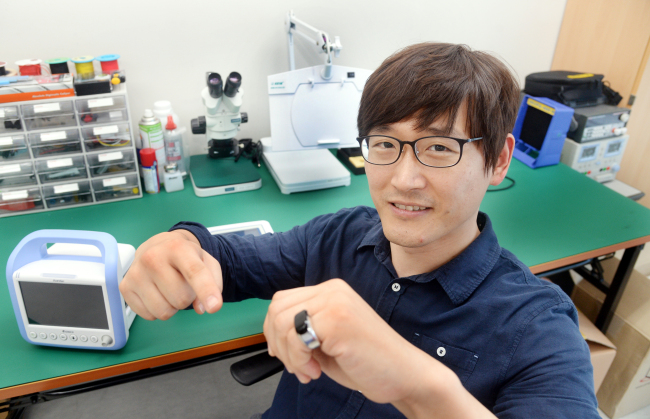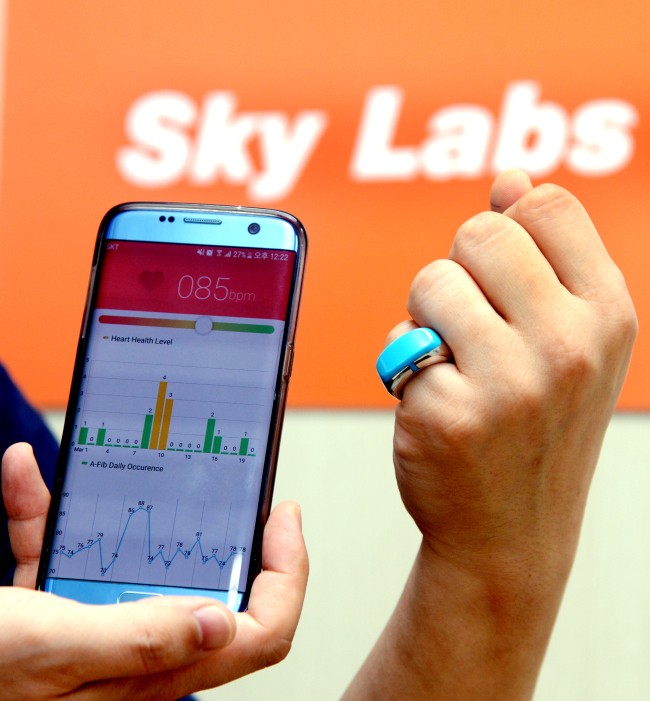[Health-tech Korea] Keeping one's heartbeat on a finger
Sky Labs’s smart ring monitors pulse 24/7 to detect irregular heartbeat
By Sohn Ji-youngPublished : Sept. 10, 2017 - 15:03
The Korea Herald is publishing a series of articles highlighting South Korea’s promising startups in the emerging sectors of digital health care and next-generation medical devices. This is the 12th installment. - Ed.
One of the most common yet underdiagnosed diseases affecting older adults is atrial fibrillation -- an irregular heart rhythm that can cause blood clots, leading to potentially fatal complications including heart failure or a stroke.
Some 150 million people worldwide are said to be suffering from atrial fibrillation, with one in four people above the age of 40 experiencing its symptoms. Despite its prevalence, the condition is undiagnosed around 50 percent of the time due to the difficulties of detection.
Targeting this problem, one South Korean tech startup has set out to increase the early detection of arrhythmia, or an irregular heartbeat, with a smart ring that continuously tracks a person’s pulse with high precision and stability.
Founded in 2015 by two signal processing engineers from Samsung Electronics’ Digital Media and Communications R&D Center, Seoul-based Sky Labs has developed a ring-type heart rhythm detection wearable device called the Cardio Tracker, or CART.
One of the most common yet underdiagnosed diseases affecting older adults is atrial fibrillation -- an irregular heart rhythm that can cause blood clots, leading to potentially fatal complications including heart failure or a stroke.
Some 150 million people worldwide are said to be suffering from atrial fibrillation, with one in four people above the age of 40 experiencing its symptoms. Despite its prevalence, the condition is undiagnosed around 50 percent of the time due to the difficulties of detection.
Targeting this problem, one South Korean tech startup has set out to increase the early detection of arrhythmia, or an irregular heartbeat, with a smart ring that continuously tracks a person’s pulse with high precision and stability.
Founded in 2015 by two signal processing engineers from Samsung Electronics’ Digital Media and Communications R&D Center, Seoul-based Sky Labs has developed a ring-type heart rhythm detection wearable device called the Cardio Tracker, or CART.

By nature, arrhythmia is often difficult to notice, because it can happen inconsistently and at random intervals. And for the patients who do manage to become aware of their symptoms and seek medical help, the checkup routine can be arduous, and sometimes ineffective.
Patients suspected of arrhythmia typically undergo an electrocardiogram, a test which records the electrical activity of the heart that requires patients to spend a day at the hospital with electrodes attached to their chest. And if the arrhythmia fails to occur within that timeframe, it is left undiagnosed.
Sky Labs’ smart ring -- a waterproof device fitted with sensors that measure pulse by tracking vein movement -- aims to overcome such limitations and make heart rhythm tracking more continuous, easier as well as less intrusive for the wearer.
In terms of the wearable’s design, the startup deliberately chose a ring-type considering its physical proximity to the fingertip, an optimal spot for tracking ones pulse, the firm said.
Though there are existing devices for tracking heart rate in daily life -- such as a digital touch pad that measures heartbeat using the fingertip or tracker pads taped on to a patient’s chest -- Sky Labs claims its smart ring offers the same functions but with superior comfort.
“By simply putting on our ring, which connects to a mobile app, users can continuously monitor their heart rhythm naturally. Our software algorithms consistently analyze this information to detect signs of atrial fibrillation,” Sky Labs co-founder and CEO Jack Lee said in an interview with The Korea Herald.
From a technology standpoint, the firm has prioritized continuous monitoring and tracking precision. It has employed special algorithms to cancel out conventional finger movements while maximizing pulse tracking accuracy.

Making the device as light and minimal for the wearer without compromising its functions has been another major point of concern, Lee said.
The Seoul-based startup said it is initially targeting patients who are currently experiencing arrhythmia as well as patients who have recovered from arrhythmia yet need continued monitoring.
Right now, the company is developing CART as a wellness device, or a specialized fitness tracker. The price is expected hover around $200. Its goal is to get it certified as a medical device by next year, following sufficient development based on credible clinical data.
It has already partnered with Seoul National University Hospital to collect anonymized heart rate data from arrhythmia patients. Following further development and safety certification, the firm aims to test out the device among patients to test out its efficacy.
Marking a milestone, Sky Labs was recently tapped by German pharmaceutical giant Bayer -- whose profits are primarily driven by its anti-clotting therapies for atrial fibrillation -- as one of the four global startups invited to its digital healthcare startup acceleration program Grants4Apps in Berlin.
Through the program, which began last month, Sky Labs will receive 50,000 euros ($59,400) in funding and mentorship from the Bayer headquarters on business development, design and strategizing.
The Sky Labs CEO expects its smart ring to complement Bayer’s business, as the initial target audience for its device are patients who have already been diagnosed with atrial fibrillation and are being treated with Bayer’s anti-coagulant therapies.
Looking ahead, Sky Labs hopes to expand the functional scope of its smart ring, including blood pressure tracker capabilities. Its broader vision is to use the continuous heart rhythm data it accumulates with its device for disease prediction as well as diagnosis, Lee said.
By Sohn Ji-young (jys@heraldcorp.com)








![[Graphic News] More Koreans say they plan long-distance trips this year](http://res.heraldm.com/phpwas/restmb_idxmake.php?idx=644&simg=/content/image/2024/04/17/20240417050828_0.gif&u=)
![[KH Explains] Hyundai's full hybrid edge to pay off amid slow transition to pure EVs](http://res.heraldm.com/phpwas/restmb_idxmake.php?idx=644&simg=/content/image/2024/04/18/20240418050645_0.jpg&u=20240419100350)







![[KH Explains] Hyundai's full hybrid edge to pay off amid slow transition to pure EVs](http://res.heraldm.com/phpwas/restmb_idxmake.php?idx=652&simg=/content/image/2024/04/18/20240418050645_0.jpg&u=20240419100350)

![[Today’s K-pop] Illit drops debut single remix](http://res.heraldm.com/phpwas/restmb_idxmake.php?idx=642&simg=/content/image/2024/04/19/20240419050612_0.jpg&u=)